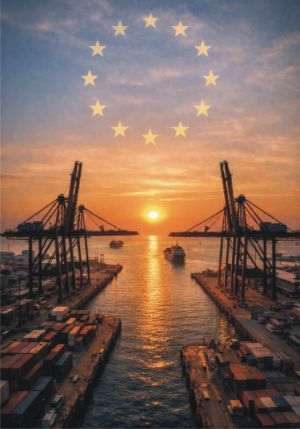European industrial group Siemens AG has withdrawn half a billion Euros from a French bank, which "Financial Times" and "Reuters" allege is named "Societe Generale" (according to a "Paris-based source"), but without being able to clearly determine whether it is indeed the bank which was abandoned by the German giant, in order to move its money from the European Central Bank, for a better interest rate, as well as due to being unhappy with the performance of the amount deposited (in which case the money had been placed in an investment vehicle, instead of a deposit), our out of concern over the health of the bank in the future, according to possible versions discussed by the foreign press, which nevertheless mentions that "Siemens" has disputed the factual accuracy of the report.
The rumor that the bank which the German company withdrew the money from might be "Societe Generale" actually adds fresh fuel to the fire started by rating firm "Moody"s", which cut the bank"s rating last Wednesday, together with that of "Credit Agricole", due to its massive holdings of government bonds of Greece and of other distressed Eurozone countries.
It must be said that "Societe Generale" ranks fourteenth in the world ranking published by "Bankers Almanac", in terms of assets (1.5 trillion dollars) which makes the huge amount of 500 million Euros, transferred by Siemens, nothing more than a speck of dust, but the fact that "Siemens" AG is the 50th among the World"s Most Admired Companies (according to a chart published by CNN Money, in which "Societe Generale" ranks 72nd), lends weight to its gesture, given the context of the fierce controversy between European bankers (who are asking the international financial institutions for funds) and the curt opinion of IMF head Christine Lagarde (who is asking them to bolster their capital).
A European source said for Reuters that the IMF estimated that European banks might face a capital deficit of 200 billion Euros (287 billion dollars).
Jean Claude Trichet, the president of the European Central Bank, yesterday expressed his agreement with the opinion of Christine Lagarde, under the pressure of the IMF report published yesterday, which predicts the worsening of the economic growth of all of the world"s major economies:
"The European banking sector has to reinforce its balance sheet and improve its resilience. Every month the Governing Council of the ECB calls upon all the banks in Europe to do all that is necessary to reinforce their balance sheets, to retain earnings, to be cautious and moderate as regards remuneration and to have recourse to a public backstop, where necessary," Trichet said.
In turn, European competition commissioner, Joaquin Almunia, yesterday warned, according to the agency Associated Press, that several European banks may need recapitalization, not just the ones that failed the stress test, due to the sovereign debt crisis (the crisis worsened after ratings firm Standard&Poor"s downgraded Italy yesterday).
In spite o the precautions and the secrecy of the operation, the action of "Siemens" AG could snowball in circumstances of panic and truly endangers the European banking system, which is shaking under the burden of non-performing loans.
Foreign capital accounts for 85.4% of the total assets of Romanian banking system, as seen in the table herewith.
The Romanian banking system has 35 banks which have foreign majority shareholders, (of which nine are branches of foreign banks), out of a total of 42 lenders, according to the 2011 Financial Stability Report of the NBR.
Greek banks accounted for 30% of the foreign capital, followed by Austrian banks (21%), according to the data of the NBR. Banks with Dutch capital had a weight of 15%, Hungarian ones had a share of 6.5%, whereas banks with French capital had a weight of 4.3%. Banks with Portuguese, Italian, Cypriot, Israeli, German and American capital account for less than 5% together.
The default risk of countries in the Eurozone is illustrated by a chart presented at the top of the article in a ranking which was determined this year by the "Centrum für Europäische Politik "(CEP).
Warning! Do not confuse a country"s risk of insolvency with the risk of default of their country of origin with the insolvency risk of the banks present on the Romanian market; they are completely different.
























































